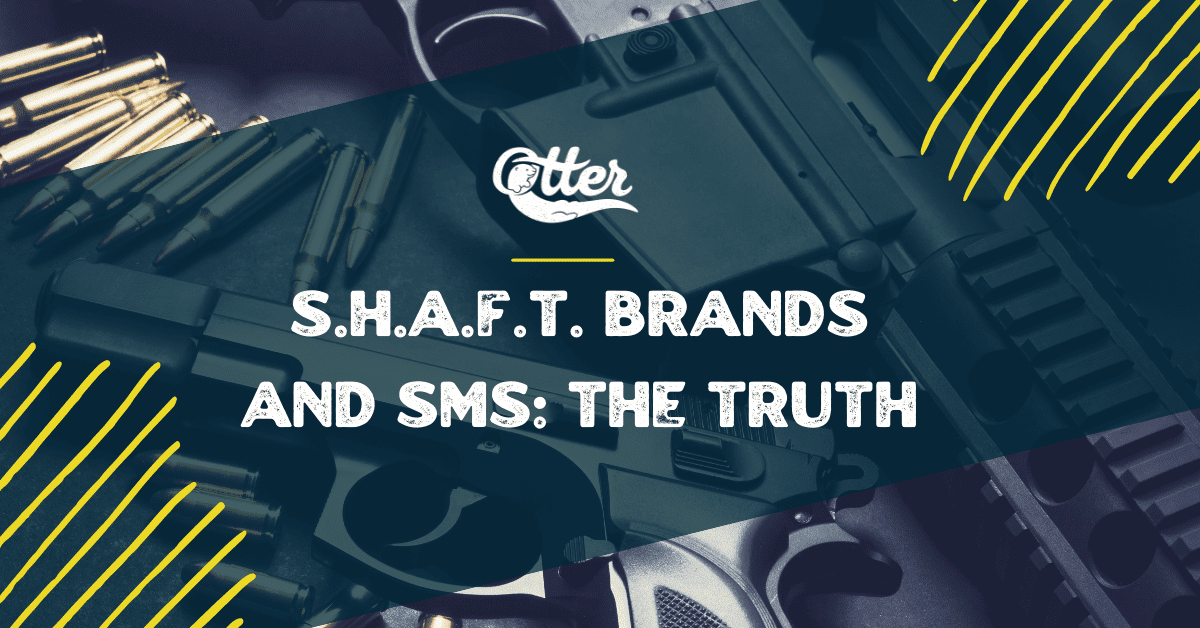What’s the deal with SMS S.H.A.F.T. (Sex, Hate, Alcohol, Firearms, and Tobacco – CBD is included in the category) compliance? SMS marketing is a powerful tool, but it comes with its own set of rules and regulations. Many marketers know that certain content is off-limits in their marketing campaigns, but they don’t know the truth behind this rule.
This comprehensive guide demystifies S.H.A.F.T. compliance and other SMS regulations. It provides you with best practices, ensuring that you stay compliant and your campaigns are effective and lawful.
What does S.H.A.F.T mean?
S.H.A.F.T. is an acronym for Sex, Hate, Alcohol, Firearms, and Tobacco.
- Sex: Sexually inappropriate message content
- Hate: Hate speech or profanity
- Alcohol: Alcoholic beverages
- Firearms: Firearms, accessories, and depictions or endorsements of violence
- Tobacco: Tobacco products, including vaping, and endorsements of illegal or illicit drugs, such as marijuana and cannabis
These categories are closely monitored and regulated by both the Cellular Telecommunications Industry Association CTIA and mobile carriers due to their moral and legal implications.
CTIA, in particular, plays a pivotal role in shaping the rules and regulations surrounding text message marketing, including those concerning SHAFT SMS content.
While Sex (adult prohibited content), Alcohol, Firearms, and Tobacco are federally legal, they come with their restrictions when marketed through SMS. One such requirement is the implementation of a functioning age-gate. Unlike a simple “Yes” click to confirm the user’s age, a proper age gate prompts them to enter their birthdate, ensuring they are over the age limit, commonly 21.
What are the penalties for violating TCPA regulations?
Fines are usually up to $500 per violation, the most common punishment for non-compliance. Non-compliance could result in consumer class action lawsuits, which can be very costly to a company. When companies receive TCPA complaints, they should ensure their legal department is aware of the complaint and take appropriate measures as soon as possible. The penalties for not complying with TCPA regulations are severe enough that it’s best to err on the side of caution and follow all guidelines when marketing via SMS message to avoid any potential problems down the line.
You need to know that SMS is subject to more restrictions and scrutiny than other marketing channels. Specific industries can only use SMS to promote content if age-gating procedures exist. Furthermore, non-compliance with these requirements may result in a suspension of the sending number, an audit, and fines.
About Age-Gating for SMS
Age-gated websites aim to prevent underage users from viewing restricted or inappropriate content. Visitors must verify their age by entering their birthdate or age before gaining access to restricted content.
The CTIA requires specific industries in the U.S. to implement age-gating; however, we recommend using it no matter where you collect SMS consent.
Providing SMS age-gating has two required parts. Underage visitors must not be allowed on SMS.
- Viewing content on a website
- Taking advantage of SMS marketing
Preventing Visitors from Subscribing
Consider including an age gate within your SMS signup form. That way, someone would have to verify their age before they become a subscriber.
You’ll need to use an age gate signup form to collect consent based on age. This form is auto-generated with your company logo on Otter Text.
In the context of age-gating, text-to-join is not considered age-gating. However, it prevents anyone under the required age from subscribing; if a subscribe keyword is sent, anyone can opt-in with text-to-join. Then, double opt-in with their birthday to confirm.
Understanding CTIA Guidelines for S.H.A.F.T. Businesses
The CTIA conducts audits on businesses involved in S.H.A.F.T. text marketing. These audits are designed to ensure compliance with established guidelines. Below are some key criteria that the CTIA focuses on during their audits, along with the required corrective actions
| CTIA Audit Criteria | Required Action |
| Federally Illegal S.H.A.F.T. Content | Remove any call-to-action related to the offending content. |
| Federally Legal S.H.A.F.T. Content | Implement a functioning age gate for the associated content. |
| Flagged S.H.A.F.T. Content (Hateful, Violent) | Remove call-to-action and disable the keyword linked to the content. |
| Incorrect ‘STOP’ Command Response | Terminate all active programs for the consumer who texts ‘STOP’ and send an opt-out text message. |
| No Product or Program Name | Clearly display the name of the program or product. |
| Failure to Respond to ‘HELP’ Keyword | Reply with additional contact information, such as a toll-free helpline or email address. |
Can I successfully complete 10DLC registration as a range, firearm retailer, or firearm distributor?
With Otter, we manage the entire process, auditing your website to ensure you adhere to all guidelines for successful 10DLC registration. To date, we boast a 100% pass rate for all firearm-related clients we’ve registered for 10DLC.
Age-Restrictions vs. Age-Gating: What’s the Difference?
Age restrictions and age-gating both aim to ensure that age-sensitive products are accessed only by those of legal age, but they operate differently.
- Age Restrictions: These legal mandates specify the minimum age for accessing certain products. They’re enforced at points of sale and are legally obligatory.
- Age-Gating: This tech-driven method is used online to verify a user’s age before granting access to restricted content. It serves as an extra layer of verification.
Effectiveness: In physical stores, age restrictions are straightforward—just check an ID. Age-gating is essential online, especially in SMS marketing as it serves as a digital ID check, asking users to confirm their age before receiving promotional content. Both are crucial but serve different contexts effectively.
What Industries Need to Age-Gate in the United States
Although some industries are prohibited from sending SMS, they can if they use an age gate, although some are permitted only in specific cases.
If you plan to run a promotion featuring a specific type of content or fall into one of the below categories, age-gating is required for compliance.
| Industry | Allowed with age-gating? |
| Alcohol | YesAge: 21+ |
| Firearms | YesAge: 21+ |
| Sweepstakes (regional laws for sweepstakes may apply) | YesAge: 18+ |

How Otter is making your life easy
OtterText makes signup easy for S.H.A.F.T. Companies with automated age gating built into Opt-in SMS. Instead of installing a third-party plugin for an age gate, Otter includes an age gate website with your logo to prevent users from accessing your website if they are under 18 or 21, based on the type of company above.
The SMS dashboard Otter Text provides is configured to allow S.H.A.F.T. Companies to advertise Ammo sales, guns, range time, and more through texting. We have implemented comprehensive CTIA and TCPA compliance policies to ensure customer satisfaction and the ability to send marketing texts.
Disclaimer
The information provided in this article is intended for general informational purposes only and should not be construed as legal advice. While we strive to keep the information up-to-date and accurate, we make no warranties or representations of any kind, express or implied, about the completeness, accuracy, reliability, suitability, or availability of the information, products, services, or related graphics contained in this article for any purpose. Compliance with laws and regulations related to SMS marketing, including S.H.A.F.T. and CTIA guidelines, is the responsibility of each business. We strongly recommend consulting legal and compliance professionals for personalized advice tailored to your needs.



